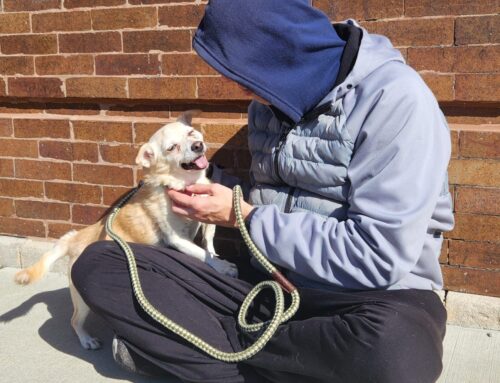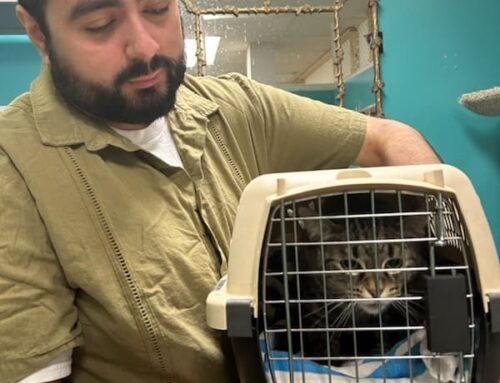FeLV – Strategies to Live with Feline Leukemia

In our experience with caring for cats suffering from a wide array of illnesses, we have noted a worrisome trend in euthanization of animals with diseases that are treatable. Sadly, many pet guardians fall into a hopeless attitude when they find that their companion has a FeLV diagnosis. But there are treatment options for cats that can help them fight the virus before life-threatening complications develop. So, we found it to be important to share this article from Lisa Jensen detailing some of those options.
FeLV: Not a Death Sentence
by: Lisa Jensen
If your kitty is diagnosed with feline leukemia (FeLV), you shouldn’t assume that it automatically points to a death sentence.
Athena, a fluffy black kitten born to a feral mother, captivated me and my husband when she first crossed our path. Because of her background, we had her tested for feline leukemia, though we considered it little more than a formality. So my heart dropped when the veterinarian told us Athena had FeLV.
Feline leukemia facts
FeLV infects 2% to 3% of cats in the US.1 It’s most prevalent in kittens before their immunity is fully developed, and in older cats whose immune systems are declining.1,4 The virus is passed through saliva and urine, but it can’t be transmitted to humans or dogs.3 It can be spread through bite wounds and from a mother cat to her kittens.1,4
There are three scenarios for cats who test positive for FeLV:
• A handful fight off the virus and live a normal lifespan, virus-free.
• Another small percentage carry the virus and spread disease to other cats without becoming seriously ill themselves.
• Most become increasingly ill and eventually die from secondary infection or are euthanized, usually within two years of diagnosis.
“Until a cat fights off the virus and tests negative, he’s considered viremic and is still contagious,” cautions Veterinarian Dr. Danielle Newman.4
Vaccination isn’t the answer
Once in a cat’s system, FeLV produces an enzyme that allows it to insert copies of its own genetic data into the cells it infects, according to the Cornell Feline Health Center.1 Vaccines don’t provide a viable solution, and FeLV isn’t considered a core vaccine for cats. Vaccination can cause reactions such as fever, sneezing, lameness and loss of appetite. Other less common yet life-threatening effects include anaphylaxis and the development of sarcomas.2 These side effects are the reason many holistic and integrative vets don’t recommend FeLV vaccines for cats who aren’t at risk.
Symptoms to watch for
Feline leukemia itself has no noticeable symptoms, but it breaks down a cat’s immunity, opening the door to numerous secondary diseases. Signs that may indicate FeLV include:
• Appetite and weight loss
• Poor coat condition
• Fever
• Inflamed gums
• Diarrhea
• Persistent eye, skin, urinary tract and/or upper respiratory infections
• Behavior changes and seizures
FeLV is commonly diagnosed using the ELISA test (Enzyme- Linked ImmunoSorbent Assay). If the ELISA is positive, an ImmunoFluorescent Assay (IFA test) will determine how advanced the disease is by showing if it has spread to the bone marrow.1,4
Holistic treatment is the best bet
There is no cure or effective treatment for feline leukemia. Conventionally, Interferon and a few other medications have been studied, but with inconclusive and mixed results. 6Consequently, treatment is usually ongoing and directed at the infection or disease of the moment, rather than the virus itself.
Veterinarian Dr. Michele Gaspar encourages holistic treatment for cats with FeLV. Any cat’s odds of beating the virus and/ or living out a normal lifespan depend on factors such as age, lifestyle and overall health. Dr. Gaspar says that treatment should be approached realistically, by giving your cat a fighting chance but keeping in mind that it could go either way. There’s always hope, however, and her recommendations give kitties a definite advantage.
“Holistic methods need to be approached with a vet who is comfortable with them,” Dr. Gaspar says. She recommends reishi, shiitake and miitake mushrooms for the immune system, and adds that Andrographis, a South Asian plant with antiviral properties, is also useful.
“I also suggest a pharmaceutical-grade L-lysine product and great nutrition with a species-appropriate diet, one that’s high in protein and less than 7% carbs. Meat should be lightly cooked as FeLV cats aren’t the best candidates for a raw diet.”
As it turned out, Athena is one of the lucky few who are able to fight off the virus – her second FeLV test came back negative. I feel fortunate to still have my fluffy, nutty cat and to have learned so much from our early ordeal, especially that FeLV in any form isn’t a death sentence.
Living with FeLV
The key? Provide high quality nutrition.
• Work with a holistic or integrative vet who can prescribe herbs and supplements that are right for your cat.
• Maintain hydration: provide fresh water and keep the environment on the humid side.6
• Encourage appetite: serve food warm and sprinkle a bit of catnip over it.
• Minimize stress: keep kitties warm and stimulate circulation through petting, massage and grooming.7
Keeping kitty FeLV-free 1,3,4,5
Keep your kitty FeLV-free by:
1. Preventing exposure by keeping him indoors, in a secure outdoor enclosure or on a harness and leash when outside (always supervised).
2. Test new cats and kittens before allowing contact with infection-free cats.
3. Segregate FeLV cats from uninfected cats in the same household. Don’t allow interaction or sharing of litter boxes, food or water dishes.
1 Cornell Feline Health Center: Feline Leukemia Virus, vet.cornell.edu/FHC/health_resources/brochure_felv.cfm.
2 Cornell Feline Health Center: Feline Vaccines: Benefits and Risks, vet.cornell.edu/FHC/health_resources/Vaccines.cfm.
3 WebMD: Facts About Feline Leukemia, pets.webmd.com/cats/facts-about-feline-leukemia-virus.
4 Danielle Newman, DVM, Mountain View Veterinary Hospital, Pocatello, Idaho.
5 Michele Gaspar, DVM, Feline DAVBP, Urban Veterinary Care, Chicago, Illinois.
6 Withrow and MacEwen’s Small Animal Clinical Oncology, Stephen J. Withrow, David M. Vail and Rodney Page, pp 23-25.
7 Frederick Cat Vet: Not Eating Well? How to Boost Your Cat’s Appetite, frederickcatvet.com/boostingappetite.html.





